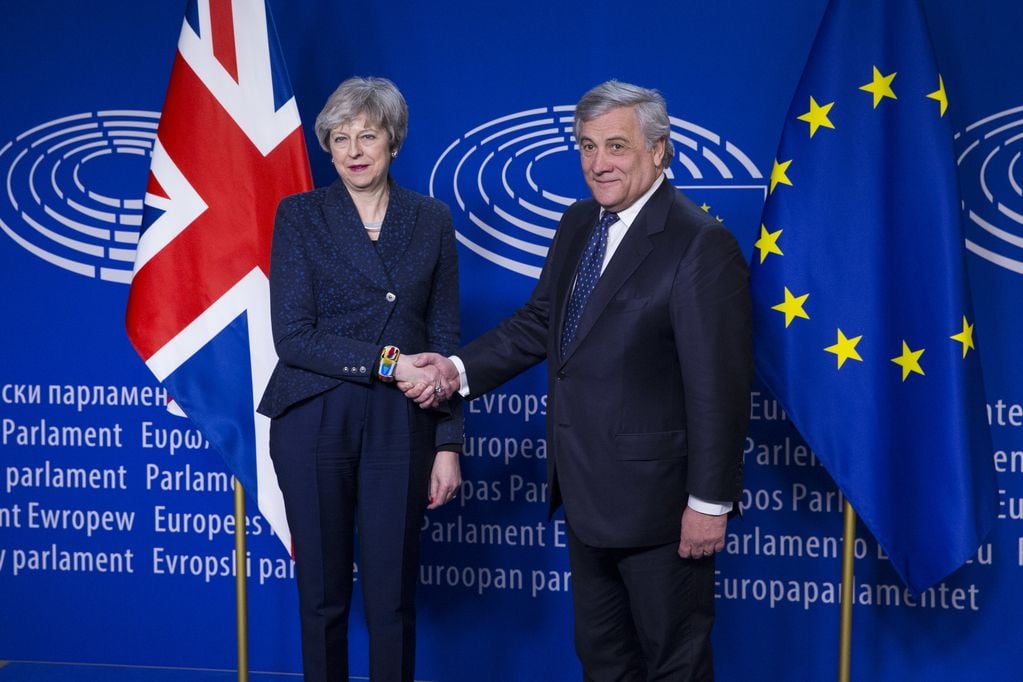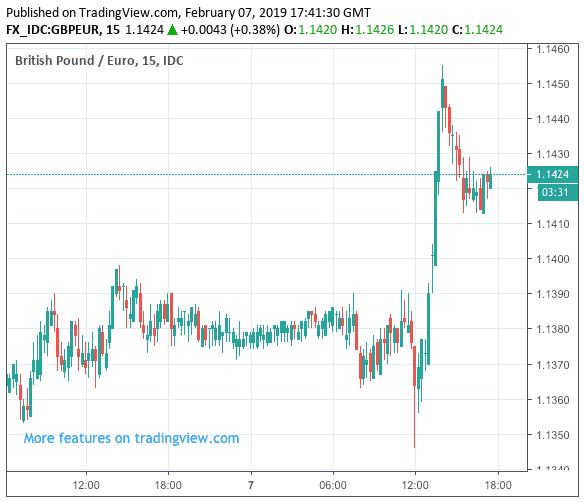The Pound-to-Euro Exchange Rate Powers Back Above 1.14

Above: Antonio Tajani, EP President meets with Theresa May, Prime Minister of United Kingdom on the negotiations on the British departure from the European Union. Copyright © Arnaud DEVILLERS, European Union 2019 - Source : EP
A strong recovery by Pound Sterling against the Euro over the course of the past 24 hours takes the exchange rate back above the psychologically significant 1.14 threshold, with the main driver of the recovery being the market's belief the foundations for a distinct pivot towards a softer Brexit by the UK are being laid.
The Pound recovered earlier losses against the single currency after it was announced further Brexit negotiations between the EU and UK will take place, while the prospect of Labour voting for a Brexit deal became more likely after the party softened its red lines and indicated it would work with the government to achieve a deal.
The potential for a cross-party resolution to the UK's Brexit impasse, as well as the announcement of a fresh round of negotiations aimed at unlocking the deadlock between Brussels and London, was welcomed by currency markets which bid Sterling higher; the GBP/EUR exchange rate posted a low at 1.1345 before rising to record the day's best at 1.1455.
Negotiations between the UK and EU on the Brexit deal will be reopened following a meeting between European Commission President Jean-Claude Juncker and UK Prime Minister Theresa May.
Following talks, described as robust but constructive, both parties agreed to hold further talks "as to whether a way through can be found that would gain the broadest possible support in the UK Parliament and respect the guidelines agreed by the European Council."
May and Juncker will meet again before the end of February to take stock of these discussions.
That May was able to get negotiations underway once more will be seen as a win for the Prime Minister who won't be heading back to London empty handed.
May's spokesperson has confirmed Brexit Secretary Stephen Barclay will discuss alternative arrangements to the backstop with the EU's lead Brexit negotiator Michel Barnier on Monday.
After his meeting with May, European Council President Donald Tusk said there was still no breakthrough in sight, but talks will continue.
May is in Brussels with the view of seeking substantial changes to the Irish backstop contained within the Withdrawal Agreement of the Brexit deal after the UK parliament earlier this month passed a resolution requiring May to seek such changes.
Indications from the European Union suggest they will give further guarantees that the use of the backstop will be time limited, but at this stage it is unknown as to whether such guarantees will come with legal force. We know some more ardent 'Brexiteers' in the UK parliament want the backstop removed completely from the Withdrawal Agreement if they are to back the deal. We also know some MPs who voted against the deal in January will be happy to have a legal guarantee that the backstop will be time limited ensuring it cannot endure indefinitely.
To us it looks like May won't be able to win over the votes of the more ardent Brexit purists, rather she will be hoping to win over a good swathe of opponents to the deal from her own party and a chunk of Labour party MPs.
Following his meeting with May, the European Parliament's Brexit coordinator Guy Verhofstadt welcomed news that the leadership of the Labour Party appears to be softening their stance on helping pass a Brexit deal.
Verhofstadt was referring to a letter sent by Labour leader Jeremy Corbyn to the Prime Minister suggesting Labour MPs would vote through a Brexit deal given May agrees to a number of conditions, most notably one that ultimately commits the UK to joining a customs union.
Verohfstadt's support for the compromise betray's the EU's strategy: they will not give May the concessions required to get a deal through parliament on the back of Brexiteer votes. Rather, they are seeking a closer relationship via a customs union that can be delivered on the back of a Labour-Conservative cross-party vote.
We are therefore seeing what we believe to be a pivot towards a 'softer' Brexit.
"Our thinking, (is) that a cross party solution may be the eventual way out of this impasse," says a note from the FX strategy desk at Citi. "To do so, May will likely have to give in to demands for a softer Brexit, pivoting towards a customs union in the Future Declaration. She will also likely have to give Jeremy Corbyn the role of White Knight, riding to the rescue, from a PR perspective."
Whatever your position on Brexit, the important takeaway here is that for the Pound what ultimately matters is the passing of a deal - any deal - before March 29. Therefore, developments today are on balance positive from a currency perspective in our view.
We believe the prospect of a softer Brexit would however require an extension to Article 50 and therefore a delay to Brexit; something the EU would likely only grant if they believe a material shift in position were to come from the UK.
France today said they would oppose any British request to delay Brexit if London was simply delaying making a decision, but could agree if London presented a credible political solution, a French government official said on Thursday.
"Fundamentally, we oppose an extension without a plan. That's clear. We won't accept it," the official, speaking on condition of anonymity, told Reuters. "If, however, the British told us: 'To build a new political solution, we need an extra three months, six months or even a year', we would be open to that."
Time to move your money? Get 3-5% more currency than your bank would offer by using the services of foreign exchange specialists at RationalFX. A specialist broker can deliver you an exchange rate closer to the real market rate, thereby saving you substantial quantities of currency. Find out more here.
* Advertisement





